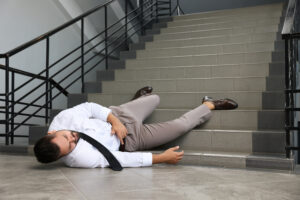Slip and fall accidents are one of the most common causes of workplace injuries. Whether it’s a wet floor, uneven surface, or poorly lit area, these accidents can lead to serious injuries. If you’ve been injured in a slip and fall accident at work, you may be entitled to workers’ compensation benefits. Understanding the process of filing a claim and the benefits available can help ensure you receive the compensation you deserve.
Common Injuries from Slip and Fall Accidents
Slip and fall accidents can result in a wide range of injuries, from minor bruises to more serious conditions that require extensive medical treatment. Some of the most common injuries include:
- Sprains and strains – These are often caused by sudden movements when trying to break a fall.
- Fractures and broken bones – Falls from heights or onto hard surfaces can result in broken bones.
- Head injuries – A fall can cause traumatic brain injuries (TBIs) ranging from mild concussions to more severe conditions.
- Back and spinal injuries – A slip or fall can cause significant damage to the spine, leading to long-term pain and mobility issues.
If you experience any of these injuries as a result of a workplace accident, you are likely eligible for workers’ compensation benefits.
Filing a Workers’ Compensation Claim for Slip and Fall Injuries
To ensure you receive compensation after a slip and fall accident, it’s important to follow the correct procedures when filing a workers’ compensation claim. Here’s a step-by-step guide to help you through the process:
1. Report the Accident Immediately
As soon as the accident occurs, notify your employer. Most states, including California, have strict deadlines for reporting workplace injuries. Delaying this step may jeopardize your ability to receive benefits. Make sure to provide a detailed account of the accident, including the location and any hazards that contributed to the fall.
2. Seek Medical Treatment
Your health should always come first. Seek medical attention immediately after the accident, even if you think the injury is minor. Some injuries, like concussions or back problems, may not present severe symptoms right away. A doctor’s examination will provide crucial documentation for your workers’ compensation claim.
3. File a Workers’ Compensation Claim
Once you’ve reported the accident to your employer, you’ll need to file an official workers’ compensation claim. This will involve completing specific forms that detail the accident, the injuries you’ve sustained, and any medical treatment you’ve received. Be as thorough as possible when filling out the paperwork, and ensure all necessary documents, such as medical records, are included.
4. Consult an Experienced Workers’ Compensation Attorney
Slip and fall injury claims can become complicated, particularly if there are disputes about the circumstances of the accident or the extent of your injuries. Working with a workers’ compensation attorney at PLBH can help you navigate the process and ensure that your rights are protected. An attorney will assist with filing your claim, gathering evidence, and representing your interests in any disputes.
Benefits Available for Slip and Fall Injuries
Once your workers’ compensation claim is approved, you may be entitled to several benefits. These benefits are designed to help cover the financial impact of your injury and ensure you receive the medical treatment you need. Common workers’ compensation benefits include:
- Medical coverage: Workers’ compensation will cover the cost of all necessary medical treatments related to your injury, including doctor visits, surgery, and rehabilitation.
- Temporary disability benefits: If your injury prevents you from working for a period of time, you may receive compensation to help cover lost wages.
- Permanent disability benefits: If your injury results in a long-term or permanent disability, you may receive additional compensation based on the extent of the impairment.
- Vocational rehabilitation: If you are unable to return to your previous job, workers’ compensation may provide assistance with job retraining or finding alternative employment.
What To Do If Your Claim Is Denied
In some cases, workers’ compensation claims for slip and fall injuries may be denied. This could happen if your employer disputes the cause of the accident, or if there is insufficient evidence linking your injury to your job. If your claim is denied, don’t be discouraged. PLBH can help you file an appeal and present additional evidence to support your case. An experienced attorney will work with you to ensure you receive the benefits you are entitled to.
Contact PLBH Today for Legal Help
If you’ve been injured in a slip and fall accident at work, the attorneys at PLBH are here to help. We can guide you through the workers’ compensation claim process and fight for the benefits you deserve. Contact us today at (800) 435-7542 to schedule a consultation.

